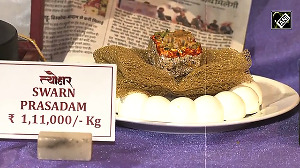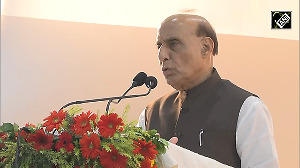The chances of the Formula One season getting off with a bang in Australia next month are greater than ever.
After the sport ripped up the rulebook to liven up last year's show and pep up flagging viewing figures, the tweaks for 2004 look less sensational but they still offer plenty of potential for drama.
New engine regulations, in particular, could have a big impact on the championship outcome even if armchair fans turning on their televisions on a Sunday are none too bothered.
"Do you think the public are going to go: 'I really like F1 now because the engines last for 700 km instead of whatever it was'?" was McLaren driver David Coulthard's wry comment. "I don't think the public cares that much."
The Scot is right of course. But if there is more overtaking, more uncertainty and more incident, then the public will be well served.
People will definitely notice if Michael Schumacher's Ferrari has to start behind everyone else or Briton Jenson Button's Honda engine erupts in a shower of shrapnel while he is leading a race.
The new rules would appear to make either scenario more likely with each driver restricted to one engine per race weekend and reliability becoming crucial.
ENGINE FAILURE
The penalty for having to replace an engine during a Grand Prix weekend is to drop 10 places down the grid from wherever the driver qualifies.
Drivers can still swap cars before final qualifying, providing the engine goes with them -- something that could happen if a chassis is badly damaged while the power unit remains intact.
In the past, drivers might have used one engine for Friday practice, swapped it out for Saturday and then fitted another for qualifying and the race. The cost, as with most things in the sport, was immense.
The change is designed to save money and whether it does or not, one thing is sure -- speed and flair will win races but the engine has got to get the car to the finish.
Teams have put in huge distances in testing to simulate races and iron out problems but the fear of failure, particularly at high-speed circuits or in the searing heat of Malaysia and Bahrain, will not go away.
"Reliability, with the new rules, will be a key factor this season," says Michelin tyre boss Pierre Dupasquier. "I believe that some of the top teams will suffer engine failures in the first few races."
Patrick Head, technical director of the title-challenging Williams team, agrees.
"The biggest change will be the one-engine rule and I think it will be very difficult to tell what the real impact of that is and who has done the best job with it until well into the season," he said.
"Everybody will go to Melbourne thinking no problem, our engine can run for 700 km.
"If in the race it then blows up, they almost certainly won't have the time before Malaysia to have corrected whatever that problem was or do the testing to verify it," he added.
The change could see top teams limiting their track time in Friday practice to save engines for the race, a blow for spectators.
But the six lowest-ranked teams, now allowed to run a third car in separate livery if they want to on Fridays, should make up some of the numbers.
TRICKY STARTS
Spectators will also see cars with larger engine covers and bigger rear-wing end-plates, a change driven by the desire to give sponsors more space for their money.
Race starts could be livelier and less polished, with electronic 'launch control' systems and fully automatic gearboxes banned although traction control remains.
"Without the launch control it is going to be very interesting," says Button of a system that allowed a driver to rocket smoothly away at the start by pressing or releasing a button on the steering wheel.
"It is going to be very different, when the pressure is getting to you on the grid and with the lights going out. It is going to be a very different game altogether."
A higher pit-lane speed limit could change strategies, with some races such as Australia on March 7 likely to become three-stop splash-and-dash affairs rather than two as a result of stops taking up less time.
Single-lap qualifying presents new dangers, with the sessions now running back-to-back on Saturday rather than spread out over two days.
The winner of the last race, and not the championship leader as it was last year when the system was introduced, starts first qualifying. The slowest cars in that session then lead off in the second.
That change will see some teams facing a very quick turnaround but could also penalise the likes of six-times world champion Schumacher if they crash at the first corner of a race.
Any engine problem, any error in qualifying could wreck a weekend. It could even shatter a title dream.







